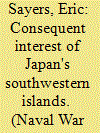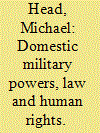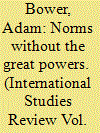|
|
|
Sort Order |
|
|
|
Items / Page
|
|
|
|
|
|
|
| Srl | Item |
| 1 |
ID:
133389


|
|
|
|
|
| Publication |
2014.
|
| Summary/Abstract |
In his classic collection of essays on maritime geography The Interest of America in Sea Power, Present and Future, Alfred Thayer Mahan opined that the importance of "portions of the earth's surface, and their consequent interest to mankind, differ from time to time."1 Just as the Mediterranean Sea once transfixed the minds of European strategists and policy makers, Mahan believed, at the turn of the twentieth century, the Gulf of Mexico and Caribbean Sea would obtain similar prominence in American strategic thinking. A century later, as we observe the relative balance of economic and military powers shifting to Asia and the Pacific and Indian Oceans, Mahan's teachings on geography are again instructive, as once seemingly insignificant bodies of water and island chains take on a new importance in regional security matters.
|
|
|
|
|
|
|
|
|
|
|
|
|
|
|
|
| 2 |
ID:
157737


|
|
|
|
|
| Publication |
New Delhi, Pentagon Press, 2018.
|
| Description |
xii, 248p.hbk
|
| Standard Number |
9789386618344
|
|
|
|
|
|
|
|
|
|
|
|
Copies: C:2/I:0,R:0,Q:0
Circulation
| Accession# | Call# | Current Location | Status | Policy | Location |
| 059320 | 355.03/KAN 059320 | Main | On Shelf | General | |
| 059321 | 355.03/KAN 059321 | Main | On Shelf | General | |
|
|
|
|
| 3 |
ID:
171453


|
|
|
|
|
| Publication |
Oxon, Routledge, 2020.
|
| Description |
x, 222p.hbk
|
| Series |
International and Comparative Criminal Justice
|
| Standard Number |
9780367343903
|
|
|
|
|
|
|
|
|
|
|
|
Copies: C:1/I:0,R:0,Q:0
Circulation
| Accession# | Call# | Current Location | Status | Policy | Location |
| 059861 | 342.0418/HEA 059861 | Main | On Shelf | General | |
|
|
|
|
| 4 |
ID:
178970


|
|
|
|
|
| Summary/Abstract |
As the UAE and Saudi Arabia find they can increasingly do without US support, they are likely to emerge as less restrainable regional actors.
|
|
|
|
|
|
|
|
|
|
|
|
|
|
|
|
| 5 |
ID:
141288


|
|
|
|
|
| Summary/Abstract |
In the past two decades, a series of major multilateral treaties were created in the absence of support—and often in the face of sustained opposition—from the United States and other emerging global leaders like China, India, and Russia. These institutions present a puzzle to prominent theories of IR because they fail to encompass predominantly powerful actors regarded as most consequential to the development and enforcement of international rules, raising questions as to their potential efficacy. This paper addresses the prospects for non-great power law in theoretical and empirical terms. I first draw on constructivist conceptions of international law as a social practice to demonstrate how multilateral treaties may generate powerful new social expectations and alter behavior even when they do not correspond to the prevailing distribution of material power in the international system. Treaties are embedded within an international social system composed of legal and non-legal elements, and these structural features generate social pressures that bear on formal members and non-parties alike. I then apply this account to an archetypal—and hard—case, the ban on antipersonnel mines. Contrary to skeptical assumptions, I demonstrate that the Mine Ban Treaty has instantiated a powerful new international social standard which has generated widespread behavioral change among treaty members—challenging accounts that emphasize enforcement by leading states—and non-parties including major military powers like the United States—challenging the view that great powers avoid new institutional developments not to their liking.
|
|
|
|
|
|
|
|
|
|
|
|
|
|
|
|
|
|
|
|
|